More people are suffering from metabolic disorders like high cholesterol levels and the most common queries are "what is cholesterol and how much cholesterol should I eat?" Cholesterol is a structural component that is found in the membranes of all biological cells. Around 80% of cholesterol is formed naturally in our body via liver whereas the remaining amount is obtained through the food we eat. Cholesterol is also a hormone's precursor molecule. The danger with high cholesterol levels is that it puts you at risk for heart attacks/strokes and other cardiac diseases.
How Much Cholesterol Should I Eat?
The nutritional guidelines suggest that the total intake of cholesterol per day should be less than 300 milligrams, as the total blood cholesterol level should be less than 200 mg/dl while less than 100 mg/dl is preferable for LDL (low density lipoprotein, a type of cholesterol which is bad). But if a person is already suffering from a heart disease, then the total cholesterol intake per day should be further reduced to less than 200 milligrams. Trans-fat must be kept as minimum as possible while saturated fat intake should be 10% of total calories you are taking in a day since both of them increase your cholesterol levels.
Foods for a Low Cholesterol Diet
After getting the answer to the question "how much cholesterol should I eat", you may wonder what foods can help you maintain a healthy cholesterol level. Here are some recommended foods for a low cholesterol diet.
1. Walnuts
 Salads are healthy to eat but we love to add lots of croutons which are loaded with carbs and carbohydrates, largely increasing your LDL levels. Therefore, a better option is to replace croutons with healthy and crunchy walnuts. Along with walnuts, almonds are also good enough to lower LDL levels.
Salads are healthy to eat but we love to add lots of croutons which are loaded with carbs and carbohydrates, largely increasing your LDL levels. Therefore, a better option is to replace croutons with healthy and crunchy walnuts. Along with walnuts, almonds are also good enough to lower LDL levels.
2. Red Wine
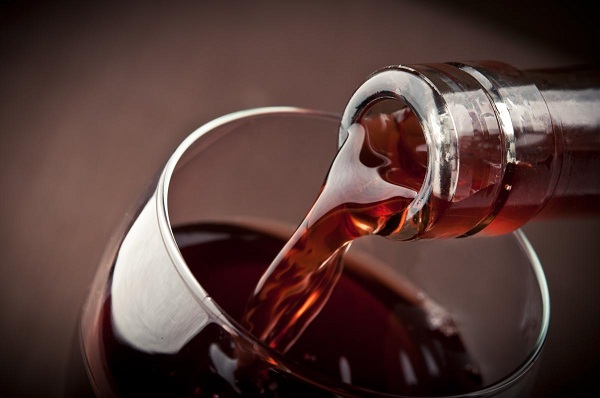 Red wines have less carbohydrate and they are also enriched with antioxidants like flavonoids which are beneficial in raising HDL (high density lipoprotein, a type of good cholesterol) level and reducing LDL. The American Heart Association recommends that the total daily intake of red wine for men is 2 glasses whereas 1 glass for women.
Red wines have less carbohydrate and they are also enriched with antioxidants like flavonoids which are beneficial in raising HDL (high density lipoprotein, a type of good cholesterol) level and reducing LDL. The American Heart Association recommends that the total daily intake of red wine for men is 2 glasses whereas 1 glass for women.
3. Edamame
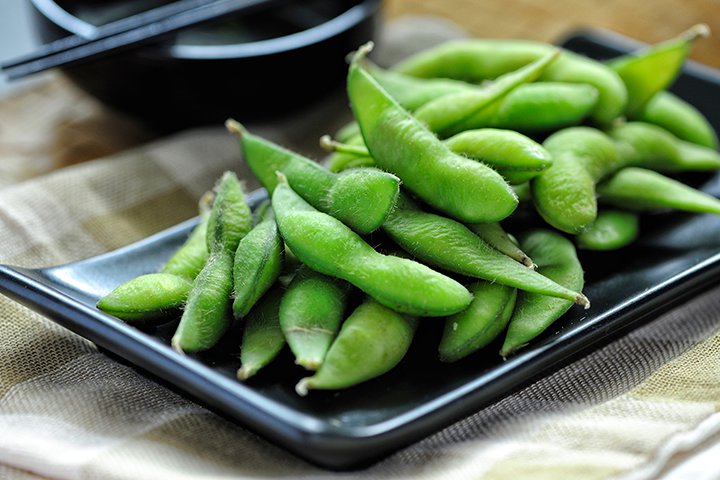 Edamame, a kind of baby soybean, can be a great appetizer. It is low in saturated fat and enriched with soy protein (25 grams of soy protein in one cup). One component, isoflavones, can protect against heart disease and certain types of cancer. You can add it into salads or use it to make rice dishes.
Edamame, a kind of baby soybean, can be a great appetizer. It is low in saturated fat and enriched with soy protein (25 grams of soy protein in one cup). One component, isoflavones, can protect against heart disease and certain types of cancer. You can add it into salads or use it to make rice dishes.
4. Ground Turkey
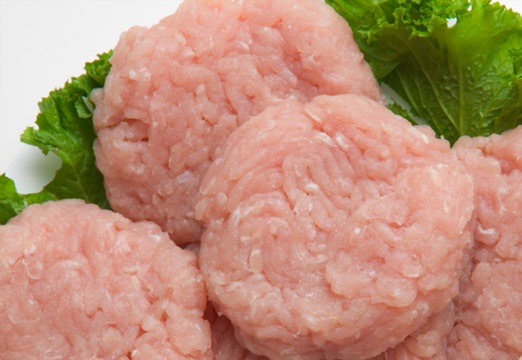 Red meat is loaded with saturated fat and is one of the major dietary sources to increase cholesterol levels. Therefore, red meat should be substituted with ground turkey in dishes like lasagna and casseroles as turkey possesses half of the saturated fat as compared to 85% of lean ground beef.
Red meat is loaded with saturated fat and is one of the major dietary sources to increase cholesterol levels. Therefore, red meat should be substituted with ground turkey in dishes like lasagna and casseroles as turkey possesses half of the saturated fat as compared to 85% of lean ground beef.
5. Salmons and Scallops
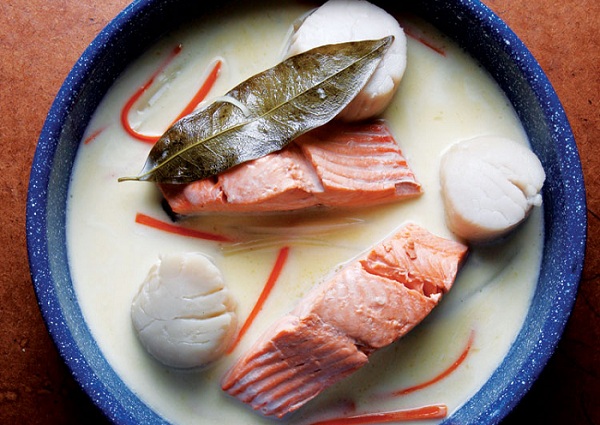 A better option to control cholesterol through diet is to eat more fish as it not only contains less fat but it is also enriched with omega-3 fatty acids which are extremely beneficial for heart health. Eating salmons and scallops will do far better than eating turkey and chicken.
A better option to control cholesterol through diet is to eat more fish as it not only contains less fat but it is also enriched with omega-3 fatty acids which are extremely beneficial for heart health. Eating salmons and scallops will do far better than eating turkey and chicken.
6. Quinoa
 A tasty alternative for rice can be quinoa, an edible seed native to South America. Rice is highly loaded with carbohydrates. Although nutritionist say that draining water after boiling rice removes major amount of starch, it is still not a healthy enough option.
A tasty alternative for rice can be quinoa, an edible seed native to South America. Rice is highly loaded with carbohydrates. Although nutritionist say that draining water after boiling rice removes major amount of starch, it is still not a healthy enough option.
7. Greek Yogurt
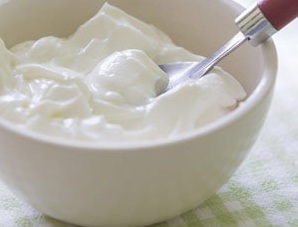 Greek yogurt is low in fat and gives a great taste to your salads. Greek yogurt will not only compliment salads but also can be used for burgers and sandwiches. Switch to Greek yogurt dressing and leave all those fatty dressings that are culprit for increasing cholesterol levels.
Greek yogurt is low in fat and gives a great taste to your salads. Greek yogurt will not only compliment salads but also can be used for burgers and sandwiches. Switch to Greek yogurt dressing and leave all those fatty dressings that are culprit for increasing cholesterol levels.
8. Avocado
 Another great food that will lower LDL levels and boost HDL levels is avocado. Avocado contains beta-sitosterol which is a fat obtained from plant origin. Its property to reduce dietary sources of cholesterol makes it a great choice for achieving low cholesterol levels through diet.
Another great food that will lower LDL levels and boost HDL levels is avocado. Avocado contains beta-sitosterol which is a fat obtained from plant origin. Its property to reduce dietary sources of cholesterol makes it a great choice for achieving low cholesterol levels through diet.
More Tips to Lower Your Cholesterol Level
Apart from the answer to "how much cholesterol should I eat" and some food recommended to lower your cholesterol levels, you can learn more tips to adjust your lifestyle and keep your cholesterol in a safe range.
1. Avoid Trans-Fat
Trans-fat is abundantly present in fast food, processed food, fried food, donuts, pastries and bagels. Trans-fats are responsible for lowering HDL levels and increasing LDL levels, therefore we should avoid them.
2. Lose Excess Weight
Shedding off extra pounds will do great in lowering cholesterol levels. It is believed that losing 10 pounds can reduce LDL cholesterol by 8%. An estimation is that a daily intake of 1000 to 1200 calories for women will be beneficial in reducing weight. While in men, dietary plans with 1200 to 1600 calories in a day will do well.
3. Exercise Daily
Staying active and keeping muscles in working condition will do a lot in raising good cholesterol level and reducing bad cholesterol level. Aerobics, cardiac workout and jogging prove to be beneficial.
4. Increase Fiber Intake
Fibrous food also helps in reducing cholesterol levels as it prevents cholesterol absorption in body. Moreover, it gives feeling of fullness so that you can eat less. Corn, broccoli, raspberries, celery, apples, cabbage, beans are fiber enriched food. But too much fiber can cause bloating, so eat it in moderation.
5. Go Fish
Eating fish two to four times per week is good as it is enriched with omega-3 fatty acids which is heart healthy. Switching from red meat to seafood will help a lot in reducing cholesterol levels. Fish such as salmon and tuna are really good for health. They can be used in main course and snacks as a delicious and healthy food option.
6. Substitute Olive Oil for Butter
Instead of greasing your arteries with butter, go for olive oil. It contains good fat and can reduce LDL cholesterol levels up to 15%. Olive oil contains antioxidants which is good for health and choosing extra virgin olive oil will be even more beneficial as it is less processed.
7. Eat Nuts
Eating nuts like almonds and walnuts also helps in reducing cholesterol levels because it prevents cholesterol absorption in the body due to presence of a substance called sterols. Nuts are also high in calories; therefore too much consumption won't do well. Munching handful of nuts or sprinkling on salads will be a good idea.
8. Reduce Your Stress
Stressing yourself won't be good for your health as it can raise your blood cholesterol level. So try to stay relaxed and do whatever makes you feel happy such as hanging out with friends, reading a good book or going for a long walk.
9. Add Spices
Do you know spices can actually help in reducing excess weight? Black pepper, coriander, garlic, curcumin and many other spices help reduce your cholesterol level. Seasoning your food with these spices adds up the flavor, too.
10. Quit Smoking
Smoking is responsible for lowering HDL and raising LDL. But not just active smoking, passive smoking as well can increase cholesterol levels. So remember to persuade your family members to quit smoking.
